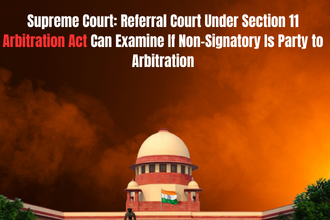Introduction
In a significant development in the realm of cross-border child custody disputes, the Supreme Court of India strongly criticized an order by a Dubai court that imposed a travel ban on a minor child. A bench comprising Justices Surya Kant and N. Kotiswar Singh described the foreign court’s decision as “atrocious” and violative of fundamental human rights, equating it to house arrest. This sharp judicial rebuke came during the hearing of a habeas corpus petition filed by a Ghanaian citizen, seeking the custody of his minor son from his Indian ex-wife.
Background of the Case
The petitioner, a Ghanaian national residing in Dubai, married an Indian woman in 2018 under the Foreign Marriage Act, 1969. The marriage was registered at the Consulate General of India in Dubai, and a son was born in 2019. The couple lived together in Dubai until 2021, when the wife allegedly left for India with the child, citing abuse and domestic violence. In 2022, the petitioner filed for divorce and was granted custody of the child by a Dubai court.
However, after the wife relocated to India with the child, she reportedly ceased communication with the petitioner. The petitioner then approached the Karnataka High Court seeking a writ of habeas corpus and enforcement of the Dubai custody order. The High Court declined to issue the writ, citing the child’s best interest and the pendency of custody proceedings in a Bangalore Family Court.
Supreme Court’s Intervention
Aggrieved by the High Court’s refusal, the petitioner approached the Supreme Court of India. During the hearing, Justice Surya Kant strongly questioned the legitimacy and morality of the foreign court’s travel ban on the minor.
“This is complete violation of human rights… Any court believing firmly in human rights and civil rights will not pass an order that you and the child are restrained from moving out. This is house arrest!” Justice Kant observed.
The Court expressed serious concerns over the foreign court’s jurisdiction, especially in granting divorce and custody orders under non-Muslim laws in a jurisdiction governed by Shariah. Justice Kant also noted that the parties, both non-Muslims, could not confer jurisdiction on a court that otherwise lacked the authority to hear the matter.
Violation of Human Rights and Constitutional Morality
The Supreme Court took a firm stand that foreign court orders, especially those restricting liberty, must align with constitutional morality and human rights principles. The travel ban, in the Court’s opinion, effectively subjected the child and mother to solitary confinement, a measure akin to imprisonment without due process.
The justices underscored that no court in a democracy should pass such orders unless the subject is proven guilty. The Supreme Court’s remarks reflect growing judicial resistance to foreign decrees that fail to consider the constitutional framework and fundamental rights enshrined in Indian law.
What the Petitioner Argued
The petitioner, represented by Senior Advocate Nikhil Goel, argued that the Dubai court had valid jurisdiction as the couple resided in Dubai at the time of the divorce. He claimed the wife was aware of the proceedings and failed to comply with court orders despite participating in virtual hearings.
He also contended that the mother had unilaterally removed the child from Dubai and had since denied him access to his son. The habeas corpus petition was based on the claim that the child was being illegally confined and that the Dubai court’s custody order should be recognized in India.
Wife’s Allegations and Defence
The wife, on the other hand, made serious allegations of domestic abuse—including physical, emotional, and psychological violence—which she claimed forced her to leave Dubai with the child. She alleged that the petitioner had manipulated legal proceedings, imposed a coercive travel ban, and filed a second divorce petition after compelling her to withdraw the first one.
She relied on Indian and international legal precedents that prioritize the welfare of the child, especially in the case of minors, and emphasized that technicalities like comity of courts should not override the child’s best interests.
High Court’s Observations Upheld
The Supreme Court, while critical of the foreign court order, did not completely overturn the Karnataka High Court’s decision. Instead, it upheld the High Court’s view that child custody issues must be decided by Indian courts when the child is in Indian territory.
Justice Kant observed that the High Court had rightly directed the matter to proceed in the Family Court in Bangalore, emphasizing that custody matters involving minors require a holistic consideration of the child’s welfare, rather than blind enforcement of foreign decrees.
The bench also issued limited notice on the habeas corpus plea—only to the extent of determining visitation rights and related reliefs for the petitioner.
Legal Significance of the Supreme Court’s Remarks
The Supreme Court’s observations have far-reaching implications:
- Reinforces Child-Centric Approach: The welfare of the child will always take precedence over procedural or jurisdictional arguments.
- Scrutiny of Foreign Decrees: Indian courts will not blindly enforce foreign judgments that violate fundamental rights or lack due process.
- Upholds Constitutional Morality: The concept of house arrest or solitary confinement without trial is constitutionally impermissible, especially in civil matters like custody.
- Highlights Jurisdictional Limits: A foreign court’s jurisdiction cannot be validated merely by residence if it contravenes the parties’ personal laws and basic legal principles.
Conclusion
The Supreme Court’s scathing remarks against the Dubai court’s travel ban underscore the Indian judiciary’s firm stance on human rights, child welfare, and constitutional morality. By refusing to enforce a decree that effectively confined a mother and child, the apex court has reaffirmed its commitment to protecting the dignity and liberty of individuals, especially in cross-border family law disputes.
This case also serves as a reminder that international custody battles must be approached with nuance, sensitivity, and a child-first legal lens. As global mobility increases, such judgments will shape how Indian courts respond to conflicting international family law orders in the future.


